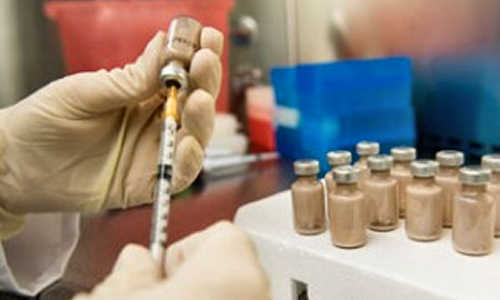A regime of anti-HIV drugs — components of regimens to treat established HIV infection — has the potential to protect against infection in the first place. But real life can interfere; the effectiveness of this prophylactic approach declines if the medications aren’t taken as prescribed.
The new drug cabotegravir (in vials above) has been shown to protect monkeys from infection by an HIV-like virus, and a clinical trial testing cabotegravir’s safety and acceptability has begun. Unlike other preventive treatments, it would require only one injection every three months.
HIV researchers hope a new compound, known as cabotegravir, could make dosing easier for some because the drug would be administered by injection once every three months. A clinical trial testing long-acting cabotegravir’s safety and acceptability has already begun at multiple U.S. sites including The Rockefeller University Hospital. Meanwhile two new studies, including one conducted by researchers at the Aaron Diamond AIDS Research Center (ADARC) and Rockefeller University, published today (January 15) in Science Translational Medicine, show that long-acting cabotegravir injections are highly protective in a monkey model of vaginal transmission of a virus similar to HIV.
“Clinical trial results have demonstrated that the effectiveness of preventive oral medications can range with results as high as 75 percent effective to as low as ineffective, and a lot of that variability appears to hinge on the patient’s ability to take the pills as prescribed,” says study researcher Martin Markowitz, a professor at Rockefeller University and ADARC. “Long acting cabotegravir has the potential to create an option that could improve adherence by making it possible to receive the drug by injection once every three months.”
Developed by ViiV Healthcare and GlaxoSmithKline, and previously known as GSK744 LA, cabotegravir is an antiretroviral drug. Antiretrovirals interfere with HIV’s ability to replicate itself using a host cell and they are used to treat an HIV infection or to prevent those at high risk from acquiring it in the first place.
Cabotegravir belongs to a group of antiretrovirals that target integrase, an enzyme the virus uses to integrate itself into the cell’s genome. This compound is a relative of an already FDA-approved integrase inhibitor, dolutegravir, but with chemical properties that allow it to be formulated into a long-acting suspension for injection.
A previous study by the ADARC and Rockefeller team in collaboration with ViiV Healthcare and GSK found long-acting cabotegravir could protect male rhesus macaque monkeys from exposure to a virus related to HIV. Following up on these results, a phase 2 clinical trial is now underway in a group of 120 men at low risk of infection. Before cabotegravir’s effectiveness in high risk individuals can be tested, trials must show that study participants tolerate the drug well and find the quarterly injections, which are a novel approach to HIV prevention, acceptable.
Both new animal studies were conducted with women in mind; in 2013 women accounted for 47 percent of new HIV infections worldwide according to the Joint United Nations Programme on HIV and AIDS. Working separately, two teams tested the drug’s ability to block vaginal transmission in two species of monkeys with different breeding cycles and susceptibility to infection.
First author Chasity Andrews, a postdoctoral fellow at ADARC and Rockefeller, and colleagues at ADARC, the Tulane Regional Primate Center and ViiV/GSK, studied female rhesus macaques treated with progesterone to increase their susceptibility to the virus. They found injections of long acting cabotegravir were 90 percent effective at protecting the monkeys from repeated high-dose exposures to the virus.
Meanwhile, the complementary study conducted by researchers at the CDC and ViiV/GSK found female pigtail macaques injected with cabotegravir were completely protected against multiple exposures to the virus.
“While we are still a long way off from showing that this drug works for HIV prevention in humans, our hope is that it may one day offer high risk women, as well as men, an additional option for HIV prevention,” Markowitz says. “One of the lessons we have learned from contraception is the more options available, the better. We are hoping for the same in HIV prevention — more options and better results.”
Story Source:
The above story is based on materials provided by Rockefeller University.





